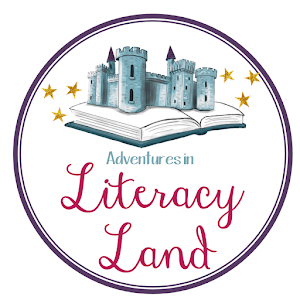Hello Royal Readers! This week we are discussing the book Summer Reading by Richard Allington and Anne Mc-Gill-Frazen. Yesterday, Andrea shared how one principal took her summer reading program on the road. You can read that post {here}. Today, we'll focus on chapter six.
Making Summer Reading Personal and Local
Summer reading loss has the potential to become a huge problem for children and school districts. Consider that a child can lose up to three months reading achievement each summer, which can accumulate to a gap of nearly 2 years by the end of sixth grade. Wow, as a reading teacher I find that terrifying!
A Summer Books Program
One district rallied together to find a solution to the summer reading loss problem. Principals, reading specialists, special education teachers, and building staffs studied Allington's work and developed a plan. Here's what they did:- Created a student interest survey for students to complete. The first year of the program, they began with first grade, adding a grade each year until the program serviced first through fourth graders.
- Developed a list of books to purchase based on the student interest survey.
- Negotiated the best prices with shipping included.
- Purchased a large quantity of books (roughly 20 per student).
- Invited student to "shop" for their summer books prior to the end of the school year.
- Challenged students to read 1000 minutes over the summer and document their minutes.
- Provided incentives (treats, surprises, postcards, phone calls, and a hotline to hear a special message) to maintain motivation throughout the summer.
- Held a community event, a mid-summer reading reunion, to exchange books for fresh reading material.
- Collected the books and calculated the minutes upon the start of the new school year.
- Assessed students reading levels.
Funding
I'm sure you are wondering how much this program cost. It was expensive, but the district had the mindset of "pay now or pay later".So how did they pay for it? They raised the money by writing grants, enlisting the help of their PTO, and forming community partnerships.
Local businesses sponsored the mid-summer reading reunions. For example "Burgers and Books" was sponsored by Bob's Big Boy, and Outback Steakhouse sponsored the "Go Outback and Read BBQ and Book Exchange". Local newspapers promoted and covered the events.
Results
Nearly 80% of children who participated in the summer books program maintained or grew over the first summer.The program has expanded over four years to serve grades 1-4. The current fourth graders, who received the books for three consecutive summers, have had the highest degree of success.
The success with special education population was especially impressive.
The program has become wildly popular. The whole community gets involved, parents are educated on the importance of summer reading, students look forward to receiving the large bag of books, and the mid-summer book exchange continues to grow each year.
Question for Discussion
What elements of this summer reading program could be used to improve the program at your school? Share your thoughts in the comment section below.
Stop back tomorrow as we conclude our Summer Reading book study with Chapter 7: Where Do We Go from Here?
OTHER SUMMER READING BOOK STUDY POSTS:
- FIVE REASONS POOR CHILDREN SUFFER MORE FROM SUMMER LEARNING LOSS
- WHY I WILL NOT PICK MY STUDENTS' BOOKS FOR THEM ANYMORE
- MAKING SUMMER READING PERSONAL
- SUMMER READING: CHAPTER 7
- WHAT'S IN THE TRUCK? ~ A DIFFERENT APPROACH TO SUMMER READING
- PREVENTING SUMMER READING LOSS: WHAT REALLY WORKS?
- SUMMER READING: GETTING BOOKS IN THEIR HANDS


















